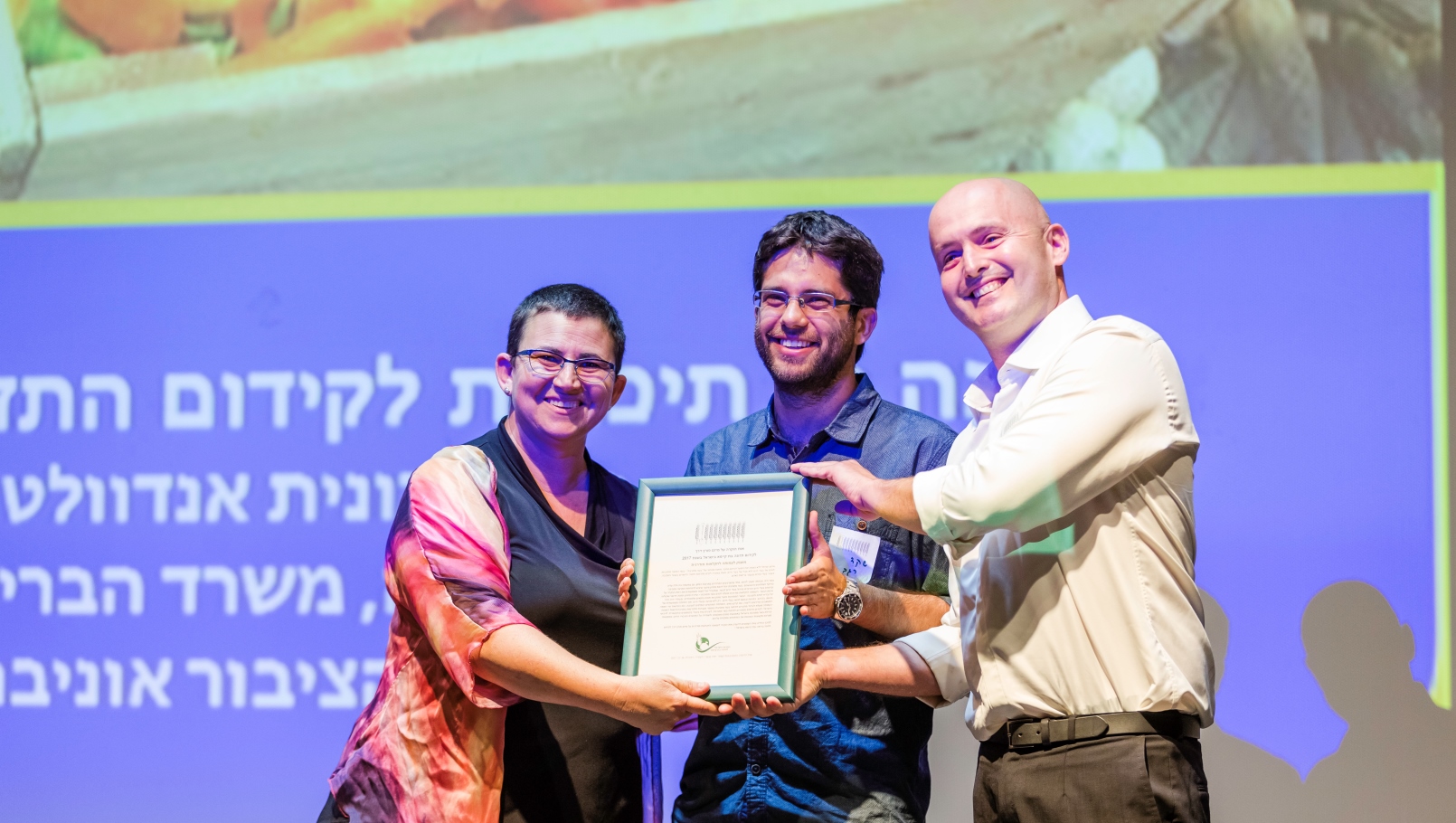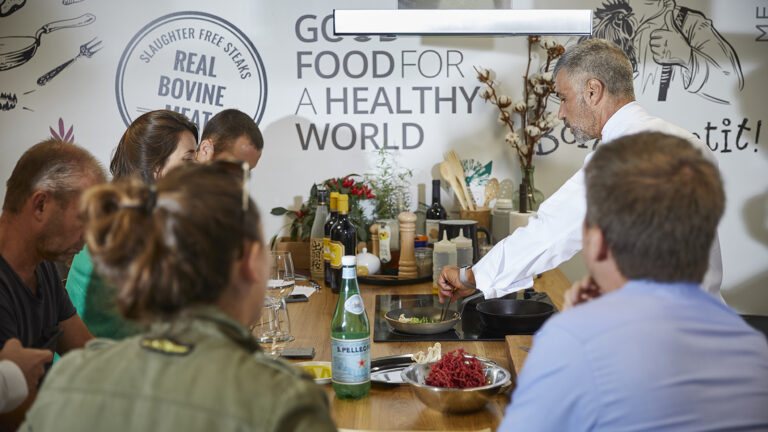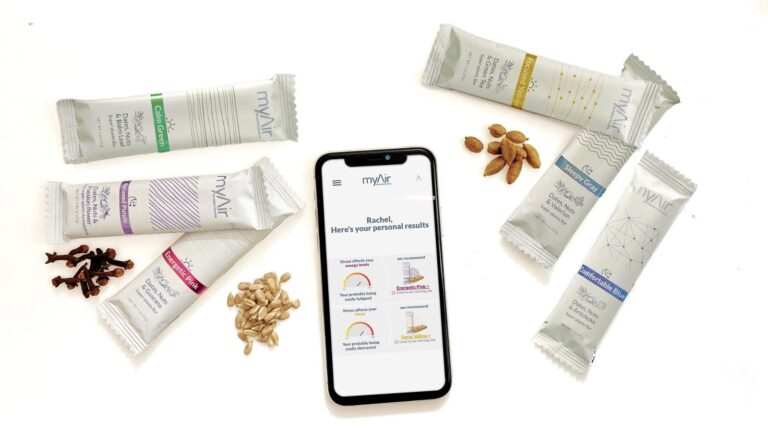What brought international celebrity chef Assaf Granit and Israeli First Lady Nechama Rivlin to a conference in Rehovot on June 26 about food and nutrition security?
After all, there’s no shortage of items to put in your market basket in Israel.
But alongside the bounty here and in other Western countries are rising rates of obesity and diabetes, food waste, uneven food distribution, poor nutrition, price increases, vanishing farmlands and health and environmental hazards across the food chain.
Granit and Rivlin joined 350 nutritionists, agriculturists, chefs, journalists, academics and officials from the health, education and defense sectors to learn how the Israeli Forum for Sustainable Nutrition (IFSN) consumer advocacy group wants them to publicize and tackle these issues.
Israeli water, cybersecurity and agriculture technologies, already adopted in many countries, provide important pieces of the food-security puzzle.
Other pieces are filled in by Israeli food-technology companies developing tools for everything from reducing sugar in processed foods to detecting contamination in the manufacturing process to growing “clean” meat in a bioreactor.
Agricultural research is another important aspect. One recent example is the publishing of the first-ever wild emmer wheat genome sequence in Science magazine by an international team led by Assaf Distelfeld of Tel Aviv University’s School of Plant Sciences and Food Security and Institute for Cereal Crops Improvement and made possible by bioinformatics developed by Israel-based company NRGene. Emmer contains many attractive characteristics that are being used by plant breeders to grow modern wheat more sustainably.
Sustainable development still needs to touch of every link in the food chain from farm to fork to ensure food security in the future, as well as less reliance on imported products, experts say.
IFSN is cultivating contacts in the United States to share ideas and solutions, cofounder and chair Hagit Ulanovsky tells ISRAEL21c.

Israel is in some ways more advanced, she says, pointing to the Mediterranean-style Israeli diet rich in locally grown produce.
“Israel is still ahead of America nutritionally. We are lucky to have the ‘Israeli salad’ for dinner and we are not eating as industrially as in the States. But we’re going in that direction too fast and we need to stop it,” says Ulanovsky, an environmental health risk-management consultant with a doctorate in environmental biology.
Last year, IFSN issued a call to action in partnership with the Manna Center for Food Security at Tel Aviv University, New York University and the Israel section of the International Union of Nutrition Sciences. It advocates creating a national master plan to implement sustainable food systems and establishing a Multidisciplinary Sustainable Food Systems Task Force to plan and monitor these systems.
Here’s what several experts told ISRAEL21c about food security and sustainability.
Hagit Ulanovsky, cofounder and chair of the Israeli Forum for Sustainable Nutrition:
We are launching several projects: an advisory service to the government and to NGOs, and promoting research in collaboration with various institutes and organizations. For example, we are working with Tel Hai College to establish indexes for rating sustainable nutrition among different populations in Israel.
In the area of policy, we want to change regulations to keep food costs low because they mostly pertain to low-nutrition items such as cornflakes and white bread. We would like fruits, vegetables, whole grains, beans and legumes to be cheaper and more accessible. No nutritionist will tell you we’re not eating enough cornflakes. We need to make healthful items affordable and teach people how to use them.
Lisa Sasson, clinical associate professor at New York University’s Department of Nutrition, Food Studies, and Public Health; health-and-wellness consultant to Nickelodeon; IFSN steering committee member:
There are a lot of parallel issues in Israel and the United States, so we can work on them together and see what’s successful. One thing we have in common is the influence of big industry over health, food and food policy. We had meetings with the Health Ministry to talk about what we’re doing in the US and how we can collaborate on some of these issues.
Chefs play a huge role in influencing food policy. This is why I have encouraged [IFSN] to bring chefs into the conversation. Chefs are very trusted by the public and they can be our ambassadors. Imagine the influence they can have if they cut down on animal protein or serve more fruits and vegetables.
This summer I will attend a conference of Hazon [a nonprofit that supports the creation of sustainable Jewish communities]. They have a branch in Israel, and we hope to have a Skype conversation between farmers in Israel and New York.
Tom Ben-Aryeh and Chen Cohen of the Modern Agriculture Foundation, which received recognition at the congress for promoting sustainable alternatives to conventional meat:
There is a worldwide crisis looming in nutrition, a lack of balance in food distribution and dangers of obesity and diabetes. Just as nations need to come together to solve problems caused by climate change, we must come together to create a better food system. What happens in one area affects the whole world.
Israel has a role to play in this collaboration because we know how to make technology and we serve as an example of a nation striving to promote Mediterranean cuisine and a plant-based diet. Israel is very aware of the problems of the meat industry and has lots of people interested in solving these problems and the right engineering technology and ideas to do it.
Dr. Elliot Berry, professor of human nutrition and metabolism at Hebrew University Hadassah Medical School; consultant to Israeli Health Ministry, UN, WHO, World Bank on food security and sustainability; member of the IFSN steering committee:

The Mediterranean diet has the most evidence of being the “super diet,” and the Israeli Ministry of Health just adopted a Mediterranean food pyramid. Recommended foods for optimal health include whole grains, fish, wine, pomegranates, figs, walnuts and extra-virgin olive oil – more plant foods and less animal and highly processed foods.
The sustainability aspects of the Mediterranean diet include major health and nutrition benefits, low environmental impacts and richness in biodiversity, high sociocultural food values and positive local economic returns.
But there’s a yin and yang between what is healthy and what is sustainable. Fish consumption, for instance, is a problem because although it is healthy there isn’t enough to go around and it’s not necessarily sustainable.
We must raise public awareness, get rid of junk food and sweet drinks for kids and encourage a healthy lifestyle. But people can’t be on a diet 24/7; you have to have a sense of humor about it and practice moderation.
Dorit Adler, head dietitian of the Israeli Council for Nutrition Security; diabetes educator; steering committee head of the IFSN:

Personal and national nutrition insecurity are big problems in the US and Israel. Today the [socioeconomically] lowest fifth of the Israeli population cannot afford to buy wholesome foods and has a 25 percent rate of diabetes.
We need more nutritionists who are also public-health promoters and policymakers. The government should do whatever is needed to make healthy basic foods available economically to everyone.
There are various ministries involved in [lowering food prices] but sometimes they work in opposition. For example, if you lower taxes on imported processed food, the incidence of diabetes will go up and we’ll pay for that through the health system.
We see ourselves as torch-bearers, giving evidence-based information and a new perspective on the complexity of the food chain and the need to collaborate. I’m sure it’s only the beginning.

















